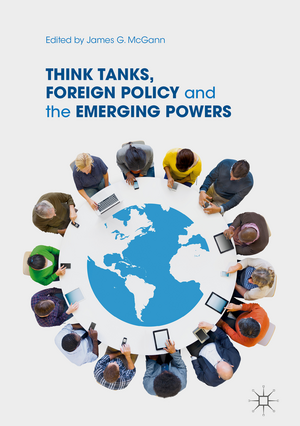Think Tanks, Foreign Policy and the Emerging Powers
Editat de James G. McGannen Limba Engleză Hardback – 20 iul 2018
| Toate formatele și edițiile | Preț | Express |
|---|---|---|
| Paperback (1) | 461.28 lei 6-8 săpt. | |
| Springer International Publishing – 15 ian 2019 | 461.28 lei 6-8 săpt. | |
| Hardback (1) | 476.47 lei 6-8 săpt. | |
| Springer International Publishing – 20 iul 2018 | 476.47 lei 6-8 săpt. |
Preț: 476.47 lei
Nou
Puncte Express: 715
Preț estimativ în valută:
91.17€ • 95.43$ • 75.88£
91.17€ • 95.43$ • 75.88£
Carte tipărită la comandă
Livrare economică 31 martie-14 aprilie
Preluare comenzi: 021 569.72.76
Specificații
ISBN-13: 9783319603117
ISBN-10: 3319603116
Pagini: 320
Ilustrații: XXX, 456 p. 32 illus., 30 illus. in color.
Dimensiuni: 148 x 210 x 35 mm
Greutate: 0.93 kg
Ediția:1st ed. 2019
Editura: Springer International Publishing
Colecția Palgrave Macmillan
Locul publicării:Cham, Switzerland
ISBN-10: 3319603116
Pagini: 320
Ilustrații: XXX, 456 p. 32 illus., 30 illus. in color.
Dimensiuni: 148 x 210 x 35 mm
Greutate: 0.93 kg
Ediția:1st ed. 2019
Editura: Springer International Publishing
Colecția Palgrave Macmillan
Locul publicării:Cham, Switzerland
Cuprins
1. Think Tanks and the Foreign Policy Challenges Facing the Emerging Powers .- 2. Think Tanks, Foreign Policy and Emerging Powers .- 3. A Not Quite Multipolar World .- 4. The Emerging Powers .- 5. Nigeria: An Overview.- 6. The Role of the Nigerian Institute of International Affairs (NIIA) in Nigerian and African Development: The Nigerian Institute of International Affairs.- 7. Republic of South Africa: An Overview.- 8. Foreign Policy and Security Challenges Facing South Africa: The South African Institute of International Affairs in South Africa.- 9. People's Republic Of China: An Overview.- 10. Emergence of a Think Tank and a Rising Power on the World Stage: China Institute of International Studies.- 11. India: An Overview.- 12. India’s Strategic Think Tank: The Institute for Defense Studies and Analyses.- 13. Singapore: An Overview.- 14. The Role of Think Tanks in Shaping Policy Debates in Asia: S. Rajaratnam School of International Studies (RSIS).- 15. South Korea: An Overview.- 16. Pushing Korea to Think in a World of Complexity: The East Asia Institute.- 17. IFANS and the 2012 Seoul Nuclear Security Summit: The Institute of Foreign Affairs and National Security.- 18. The Socialist Republic of Vietnam: An Overview.- 19. Shaping the Security and Foreign Policy of Vietnam: The Diplomatic Academy of Vietnam.- 20. Argentina: An Overview.- 21. Dealing with Argentina’s Foreign Policy in the Emerging Multi- Polar World: A Comparative Analysis of Think Tanks Responses towards the Malvinas Issue: The Argentine Center of International Studies.- 22. Brazil: An Overview.- 23. Beyond “Backwater” and “Backyard”: Reframing Security in the South Atlantic: The BRICS Policy Center.- 24. Mexico: An Overview.- 25. Think 20: An Innovative Proposal for the G20 Summit.- 26. Qatar: An Overview.- 27. Research Centers and the Challenges of Formulating State Security and Foreign Policies in Emerging States: The Case of Qatar: Al Jazeera Centre for Studies.- 28. Turkey: An Overview.- 29. Shaping Foreign Policy Debates in Turkey: The SETA Foundation for Political, Economic, and Social Studies.- 30. Think Tanks, Foreign Policy and National, Regional and Global Politics.
Notă biografică
James G. McGann is Senior Lecturer in International Studies and Director of the Think Tanks and Civil Societies Program (TTCSP) at the University of Pennsylvania, USA.
Textul de pe ultima copertă
This book examines changing international dynamics through the lens of some of the leading think tanks from the emerging powers in the world. Through twelve case studies, the authors explore how security and international affairs think tanks in emerging powers collaborate with their policy makers to meet current and anticipate future foreign policy and security challenges. Overall, the book illustrates and analyzes how think tanks in a variety of political and economic contexts are able to contribute to their respective policy-making processes. Included in the discussions are the problems or successes that each respective nation’s think tanks face, where they feel the emerging nation will be positioned, and where they are failing to meet the policy challenges they face. The book provides a comprehensive look at successful foreign policy formulation to serve as examples for other think tanks in similar political and economic conditions.
JamesG. McGann is Senior Lecturer in International Studies and Director of the Think Tanks and Civil Societies Program (TTCSP) at the University of Pennsylvania, USA.
Caracteristici
Synthesizes the growing literature on think tanks and on the foreign policies of the emerging powers within the context of power shifts and new dynamics in current international affairs Demonstrates with a broad cross-section of countries how think tanks, in collaboration with their respective governments, are able to respond to the new challenges and dynamics of an increasingly multipolar world Identifies the transcendent trends among twelve think tanks and highlights the transferable approaches that could be adopted by other emerging powers
